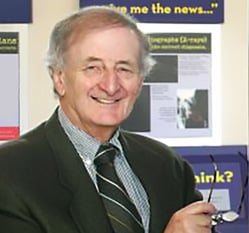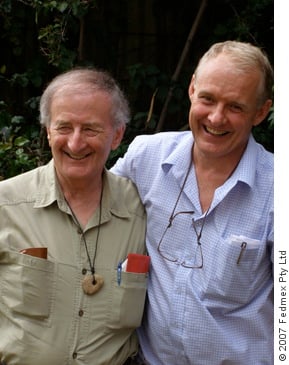3. ABOUT THE WORLD TRANSFORMATION MOVEMENT
WTM FAQ 3.15 What was Professor Prosen’s background?
[Note: this answer is repeated in WTM FAQ 1.8]
A Patron of the WTM, Professor Harry Prosen MD (1930-2021) was a professor of psychiatry who worked in the field for over 60 years, including chairing two departments of psychiatry and serving as president of the Canadian Psychiatric Association. Professor Prosen was appointed one of 500 Specially Selected Fellows of the American College of Psychiatrists, and a Distinguished Life Member of the American Psychiatric Association. He was also psychiatric consultant to the Bonobo Species Preservation Society. (To listen to a brief 2012 radio interview of Professor Prosen talking about his amazing psychiatric work with bonobos, see the link under Professor Prosen’s photo on his Wikipedia page.)
In 2004 the WTM began an undertaking to make a documentary about the human condition. The detailed proposal Jeremy Griffith wrote for the documentary received commendations from over 100 of the world’s leading scientists and thinkers. Professor Prosen was one of those scientists who responded enthusiastically to the documentary proposal when it was sent to him in 2004, and he subsequently visited the Sydney WTM Centre in Australia.
In 2009 Professor Prosen gave the following commendation on the importance of these understandings (via Skype), which can be viewed in Part 2 of the Introductory Video in the WTM Video Library: ‘Thank you Tim, it’s nice to be with you all in Australia. I have been a student of psychiatry for many years. What I have to tell you is that I have no doubt this biological explanation of Jeremy Griffith’s of the human condition is the holy grail of insight we have sought for the psychological rehabilitation of the human race. I cannot urge you strongly enough to listen to what Jeremy Griffith has to explain. My message is as simple as that. This is all so exciting; I’m quite overwhelmed to be here on Earth when these answers are finally found. Thank you for the opportunity to speak with you.’
Professor Prosen also wrote the Introduction to Jeremy Griffith’s 2016 book FREEDOM: The End Of The Human Condition (an adapted excerpt of this Introduction is provided in Freedom Essay 19: An Introduction to the significance of FREEDOM, by Professor Harry Prosen).
In 2010 Professor Prosen became a patron of the WTM.
Professor Prosen’s Obituary by Jeremy Griffith
It is with heartbreaking sadness that I report the death on 21 June 2021 of Dr. Harry Prosen at the age of 90. Harry was our charity’s patron, and most loved and cherished supporter of the WTM’s mission of bringing understanding to the human condition.
Harry and me in Sydney in 2007. Harry has a shaman stone
around his neck that was given to him by an Inuit holy man, basically
because he experienced Harry’s extraordinary capacity for empathy.
As mentioned above, Harry became aware of our project when he received a copy of a documentary proposal I had written and the WTM had circulated in 2004. The human condition is not an easy subject for most people to readily access, but Harry was instantly able to absorb and appreciate the explanation of the human condition it contained. Indeed, Harry was so impressed with it that, as is described in the following section, he came to Australia in 2007 to defend our work at the WTM in what was then the biggest defamation case in Australia’s history. That we were able to succeed in defending the merit of my explanation of the human condition is in large measure due to the support Harry, along with other international scientific experts, gave at the trial.
Harry’s great interest and clinical work with patients was focused on inter-generational issues in families, particularly empathy and empathic deficits. Harry’s extraordinary capacity to empathetically reach into people’s troubled souls, and even into animals’ distressed states (as he famously did with the bonobo Brian), and by so doing bring healing relief to them, shows how special a psychiatrist Harry was. Harry had one of the highest IQs you can possibly have and was incredibly successful in the mechanistic academic world, and yet there was also this sensitive child still alive within him that enabled him to easily access and respond positively to all the long-repressed soulful truth he recognised in my writings about the human condition. He was possessed of an extremely rare combination of powerful intellect and sensitive soul.
Since meeting Harry when he came out to Australia, and up until his death in 2021, I spoke with him on the phone on a weekly basis — nearly 20 years of regularly talking with each other. We became the very best of friends, as you can see in the above photograph. Every time I spoke with Harry his voice instantly calmed and settled me because it was always so warm and empathic. This job of bringing understanding to the human condition is extremely difficult because the human condition has been such an off-limits subject for humans to face (hence the court case we had to fight to defend our work), but Harry was always right there with me, calmly encouraging and nurturing me with his extraordinarily empathetic love and appreciation of the importance of our project.
The following messages to Harry’s son David, who I have also come to know and love, summarise how deeply I love and miss Harry: “Harry’s precious sunshine has returned to the heavens to flood down around us and look after us and encourage us all the time now; his friendship to this earth is eternal. Thank you Harry for your life, thank you so much. We all here in Australia send you all over there mountains and savannahs and oceans of love. It’s comforting to think of Harry and Yvonne [his recently deceased beloved wife of 68 years] together again.” And when the family published their obituary, I wrote to David: “I love that photo of Harry, although it made me cry a lot. I honestly think I could easily subscribe to the old ancestor worship religion where you never let go of your loved ones, I could easily do that. I miss them so much the pain is excruciating. Please give the Wisconsin hummingbirds a little pat from me David next time you see them, I miss them too, and seeing you. And thank you and your whole family so very much for all the kindness you have shown me and the WTM over the years. Here are some flowers we picked from the garden to celebrate Harry’s life.”
The real tribute that we in the WTM can give Harry is to enthusiastically continue to carry on our work of bringing understanding of the human condition, because that is what Harry was always encouraging us and helping us to do. Thank you Harry for your wonderful life, and for all your precious love and support of our project to save the world. You will never, ever be forgotten, because this project will succeed in saving the world, and one of the great reasons its love will triumph is because of your great love.
Professor Prosen’s participation as a scientific
expert in the defence of the scientific and scholarly
standard of Jeremy Griffith’s work
In March 2007, a trial began in the Supreme Court of New South Wales to determine defences and damages following a jury’s 2003 finding that the Australian Broadcasting Corporation had defamed Jeremy Griffith and Tim Macartney-Snape in a 1995 Four Corners television program. During the trial, four international scientific experts, including Professor Prosen, took the stand in defence of the scientific and scholarly standard of Jeremy Griffith’s work.
From the report by Professor Prosen tendered at the trial:
‘Mr. Griffith’s work is important and significant to my field of psychiatry. I also consider that it is of significance to all of science. In my view, it explains the nature of “The Human Condition”.
The first two books I read, “Free” and “Beyond”, are amazing platforms which describe the basic findings made and explanations put forward, by Mr Griffith. Mr Griffith’s subsequent writings do not change in basic concept but we see increasing elaboration, background and opportunity scientifically to understand the Human Condition and ameliorate it.
These writings in many ways further basic evolutionary concepts and thus are seen by some as controversial, but the majority of scientists, anthropologists and sociologists whom I know to have considered these works have become very excited and perhaps had their own thinking take a leap forward as they have read and re-read Mr Griffith’s work. Even the nay-sayers, in my view, have not been able to put forward evidence which refutes Mr Griffith’s ideas in a scientific way. The persons who have taken negative views of Mr. Griffith’s notions are not to be belittled, but in no criticism that I have seen is there a truly scientific rebuttal. In my opinion, the scientific validity of Mr Griffith’s work is supported in every way possible, from archaeology, primatology, genetics and evolutionary facts.
All of the above has convinced me of the scientific accuracy and significance of this work. My own applications of it are as a psychotherapist of some 40 years standing, in clinical work and writing and also as I see the early stages of consciousness in my work with primates.’ Professor Prosen concluded that ‘In my opinion, Mr Griffith’s work, including Beyond, is of the highest scientific merit.’
Professor Prosen’s Extended Profile:
Emeritus Professor of Psychiatry and Behavioural Medicine, Medical College of Wisconsin.
Professor Prosen was a professor of psychiatry who worked in the field for over 60 years, including chairing two departments of psychiatry and serving as president of the Canadian Psychiatric Association. He was a member of a select group of 500 Distinguished Life Fellows of the American Psychiatric Association. He was also psychiatric consultant to the Bonobo Species Preservation Society, and assisted those working with one of the largest collections of captive bonobo primates in the world at the Milwaukee County Zoo.
He obtained specialist standing in psychiatry in three countries—Canada, the United States and England. Around the time of his presidency of the Canadian Psychiatric Association, Professor Prosen also chaired, for six years, the Specialty Committee in Psychiatry of the Royal College of Physicians and Surgeons of Canada.
As former Head of the Department of Psychiatry at the University of Manitoba and Chairman of the Department of Psychiatry and Behavioural Medicine at the Medical College of Wisconsin until late 2003, Professor Prosen was responsible for continuing in a major way the development of two departments of psychiatry and, for this work, was listed in the 2005–2006 America’s Registry of Outstanding Professionals.
He was continuously involved in the teaching of psychiatry and in clinical work with patients, with special emphasis on inter-generational issues in families, particularly on empathy and empathic deficits. Much of this work originated in studying variations of the life-stages of humans, then developing an inter-generational approach to psychiatric treatment. Some of his early publications focused on non-verbal communication and also variations in facial features under different emotional circumstances.
Professor Prosen’s interest in empathy prepared him for his work with primates, in particular bonobos who are thought to be the most empathic of all primates. It allowed him to participate in the work of a group of primate experts studying bonobo culture and development and saw him receive numerous consultations from the United States and other parts of the world on psychological and other problems in primates (especially bonobos) and other species. The rehabilitation of a very disturbed young bonobo, named Brian, by Professor Prosen and his colleagues generated substantial publicity, including a story in The Atlantic.
He wrote over 70 books, monographs and articles, reviewed over 30 books and delivered over 60 presentations at various conferences. He was a peer-reviewer for the American Journal of Psychotherapy.
Professor Prosen obtained his M.D. in 1955, his M.Sc. in 1957, and his Diploma in Psychiatry in 1959—all from Canada’s University of Manitoba.
- - - - - - - - - - - - - - - - - -
You can watch marvellous footage of Professor Prosen affirming the significance of FREEDOM: The End Of The Human Condition in Video/Freedom Essay 7, which was filmed in February 2014 at the Milwaukee County Zoo in front of the Zoo’s extraordinarily cooperative and empathetic group of bonobos. We also recommend reading his Introduction to FREEDOM.




